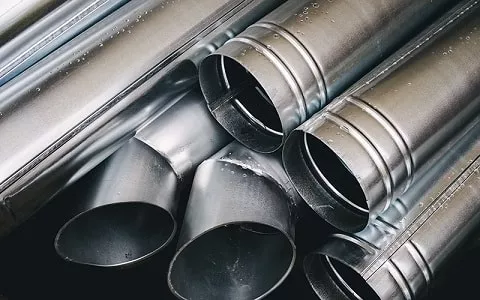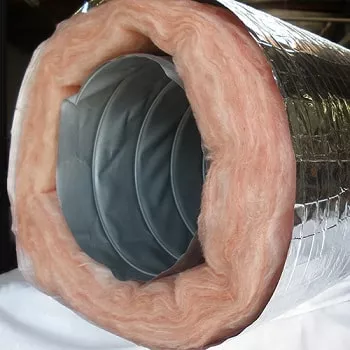
Whether you are finishing a new basement or installing a new heating and cooling system, chances are you will be working with HVAC ductwork. Ducts are the channels through which air moves through your house to bring you heat in the winter, and cooling air in the summer.
Duct is commonly made of pieces of sheet metal and is either rounded or rectangular. If you are working with ductwork in your home it's important to know how to connect ductwork for maximizing efficiency.
Connecting Ducts
Connecting ducts can be an easy process if you know what you are doing. When connecting HVAC ductwork in your home you need to follow instructions so carefully. The wrong step could leave your home without a properly functioning air conditioner or heater. You might even find yourself paying hundreds of dollars in extra energy bills because of all the air that isn't flowing properly. By putting your ductwork together carefully you are not only saving yourself from a lot of repairs later on down the road, but you are also making your home more efficient. If you are installing ductwork in your home it's always so important to read the instruction manual that comes with it. Here are procedural tips:
- Ensure proper insulation. When you weave your ducting through unconventional spaces like attics and crawl spaces you are susceptible to inadequate insulation which will result in heat loss. Guard against this with proper planning.
- Make sure you properly seal joints* between connecting HVAC ductwork.
- Round duct is probably more efficient in delivering the proper climate, but it's not always as practical to install as rectangular HVAC ductwork. Squared edges are easier to fit in the desired spaces.
- Be careful to avoid getting ductwork that is undersized. This can create both noise and inefficiencies.
Here are some additional tips:

Read Up On the Laws
First things first, always check with your local state to find out what the building code laws are for HVAC installation. Some states have some pretty strict laws and it's important to know what they are before you begin the process. You also may want to check with your insurance company. Some insurance companies will void home insurance for that kind of work done on the house.
Purchase Quality HVAC Ductwork that Will Last
If you are purchasing ductwork material to install in your home it's so very important to choose a product that is going to last. It's important to buy from a company who has quality products and really knows their stuff. Before purchasing your material do your research. Find out what type of ducts are right for your home. Certain ductwork that is good for one house, might not be good for another.
Always Wear Safety Gear
If you are going to be installing ducts in your home it's so important to wear safety gear. Goggles, work gloves, helmet, and a mask are all important things to have on hand before you start your project. You never know what kind of problems you may come across while you are installing. It's always a good idea to be prepared by wearing the proper safety gear.
Connecting Round Ductwork in Your Home
Connecting ducts in a home is a rather simple process and can be done by anyone who educates themselves first. If you are going to be installing ductwork in your home be sure to read the instruction manual, check out building code laws, and wear appropriate safety gear. By following these few simple instructions you will save yourself from a lot of heartache later on down the road.
*We recommend foil tape for tight seals. Ducts are connected together with s-cleats or drive clips and best sealed with foil tape. Duct tape can be used as well, but the heat will eventually wear duct tape down and make it brittle. The foil tape is actually an adhesive strip of thin aluminum so it will not break down over time. An s-cleat is actually shaped like an "S" and is used when you have 2 straight ends that come together. One end of the ductwork slips into the "top" of the s and the other slips into the bottom, effectively layering the HVAC ductwork together.
A Drive cleat is shaped like a "C" and used when you have to duct ends together. They are generally used when attaching end caps, tees, and other fittings like elbows to the ductwork. In these cases, a tool called a "hand brake" is very useful to the do-it-yourselfer. This tool is used to create a 180-degree turn on your duct end so the Drive Clip has something to grasp too. One thing to Remember when installing ductwork is proper support. Although individual pieces of ductwork seem light once a system is put together it can way hundreds of pounds. Some contractors use leftover pieces of s-cleat or c-clip and shape it like a backward Z, the bottom tab of the "Z" will screw to the bottom of the ductwork and the top tab of the "Z" will screw into the joist or truss.
Another simple and inexpensive way is to attach Duct strap to it. Duct strap is a made of a durable Nylon webbing and has a tinsel strength of over 400lbs. You can pick up 100-yard roll for around $10.00 at any local hardware and less online.
Please Share This Guide
If you appreciate what you learned in this how-to connect ductwork tutorial, please share it on social media. Remember to save on Duravent and other spectacular brands at PlumbersStock. We have everything, from ducting to dampers!
Related resources:
How to Clean In-Wall Dryer Vent
How to Reduce Ductwork
How to Install a Diffuser
How to Use Duct Seal
What Do Diffusers Do?
What Is a Fire Damper?



